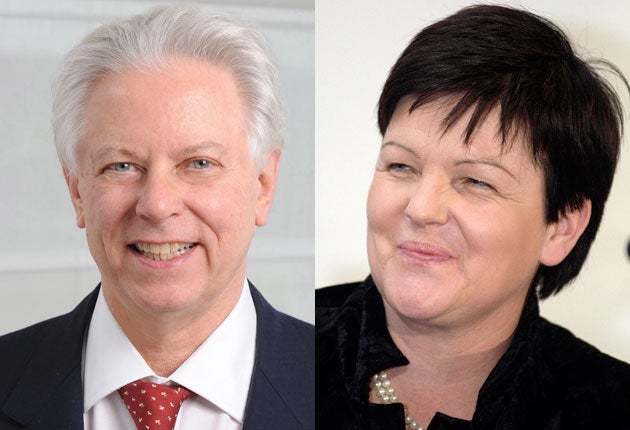Cameron to play balancing act with trade and human rights

Your support helps us to tell the story
From reproductive rights to climate change to Big Tech, The Independent is on the ground when the story is developing. Whether it's investigating the financials of Elon Musk's pro-Trump PAC or producing our latest documentary, 'The A Word', which shines a light on the American women fighting for reproductive rights, we know how important it is to parse out the facts from the messaging.
At such a critical moment in US history, we need reporters on the ground. Your donation allows us to keep sending journalists to speak to both sides of the story.
The Independent is trusted by Americans across the entire political spectrum. And unlike many other quality news outlets, we choose not to lock Americans out of our reporting and analysis with paywalls. We believe quality journalism should be available to everyone, paid for by those who can afford it.
Your support makes all the difference.David Cameron will fly to China today at the head of a delegation of more than 40 business leaders in a drive to win a multi-billion pound export boost for British business in the world's fastest-growing major economy.
Senior figures from the City, manufacturing and energy will join representatives of well-known high-street names, including Boots, Tesco and Mothercare, in trying to clinch contracts in the booming Chinese market. In a demonstration of the importance that ministers place on China, the Prime Minister will head the largest British government delegation to the country.
But Mr Cameron will have to strike a delicate diplomatic balance in banging the drum for British exporters at the same time as he comes under pressure to signal concern over Beijing's human rights record.
The British Government is anxious to close a huge trade gap with the world's most populous nation. The UK imported Chinese products worth £25.4bn last year, but goods worth just £7.7bn went in the opposite direction – less than the value of British exports to the Netherlands, Belgium or Spain. Britain also lags behind European Union partners Germany, France and Italy in export sales in China.
Ministers hope that China – which recently overtook Japan to become the world's second largest economy after the US – will be a major driver in helping the world to emerge from economic stagnation. Its economy is forecast to grow by more than 10 per cent this year, with western countries happy to achieve growth of 2 per cent.
Mr Cameron and four Cabinet ministers will be accompanied by 43 business leaders. They include Stefano Pessina, the executive chairman of Alliance Boots, Ben Gordon, the chief executive officer of Mothercare, and Lucy Neville-Rolfe, the executive director of Tesco. All three retailers have begun expanding into China, catering to the country's rapidly growing middle-classes.
One British export which falls into this category is whisky, which will be protected from locally-distilled imitations under an agreement to be signed this week. The two countries have agreed that only whisky produced in Scotland can be marketed as Scotch in China. The value of whisky exports to the country has leapt from £1m in 2001 to £80m last year.
Meanwhle, several firms, including Shell, will seek to tap into the burgeoning demand for energy supplies. There are also hopes that Britain can sign a major oil exploration contract during Mr Cameron's two-day visit.
Barclays, the Royal Bank of Scotland, Whitbread, Rolls-Royce Marine and Legal & General are among other major names sending senior representatives in the hope of boosting their presence in China.
Although China has developed a free-market economy, building political ties with its communist regime is crucial for securing contracts. Mr Cameron will begin his visit with a meeting with Premier Wen Jiabao.
British sources insisted the Prime Minister would confront tricky foreign policy issues including Iran, where Chinese firms have been accused of violating UN sanctions on nuclear development work, and Chinese links with African regimes.
As The Independent disclosed last week, he intends to raise the imprisonment of the Nobel laureate Liu Xiaobo in talks. Chinese sources have warned that public criticism of the treatment of the activist – regarded by Beijing as a criminal – would be construed as an attack on the Chinese legal system.
It was not clear whether Mr Cameron would allude to the plight of the artist Ai Weiwei, the creator of the "sunflower seeds" installation at London's Tate Modern gallery, who is under house arrest in Beijing.
The sensitivity of such issues means that there is a question mark over whether a press conference will be staged between the two leaders at the end of the summit.
Mr Cameron will be accompanied by George Osborne, the Chancellor, Vince Cable, the Business Secretary, Chris Huhne, the Climate Change and Energy Secretary, and Michael Gove, the Education Secretary. The latter will join the delegation because of the huge value to universities of the 100,000 Chinese students studying in Britain; just 3,000 UK nationals are studying in China.
From Beijing, Mr Cameron will head to South Korea for the G20 summit of world leaders on Thursday and Friday. The Seoul meeting is likely to be dominated by growing tensions between China and the US, which accuses China of artificially depressing the value of its currency.
Join our commenting forum
Join thought-provoking conversations, follow other Independent readers and see their replies
Comments